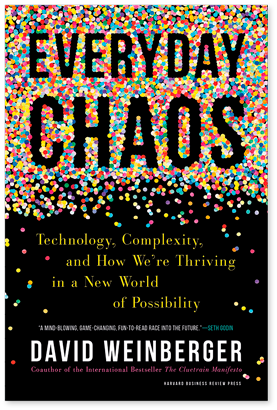For this edition we reviewed David Weinberger’s best seller Everyday Chaos. Although this book was published three years ago (publication date: 2019), we consider the theme still as very relevant. The reasons are obvious; today’s world is facing a turmoil of (geo)political, environmental and economic challenges – giving us little certainty about what’s next and how to anticipate.
In short, Weinberger describes the evolution of prediction, starting in the 17th century with Newton’s laws up to our current acceptance that not everything can be predicted, but that we have to deal with uncertainty. In order to anticipate to an increasing level of uncertainty, we embrace strategies like A/B testing, Scenario Planning, Minimum Viable Products, and Open Platforms. The advantage of these strategies is not necessarily the level of certainty they bring, but a better provision of flexibility allowing us to adapt to future changes. According to Weinberger, an important success factor to manage the uncertainty is to implement a solid level of interoperability as this will allows us to have a better grip on the rules of (business) engagement. In his book, Weinberger gives various examples of how for instance artificial intelligence can help to get a better grip on this uncertainty.
This book is definitely an interesting read, especially as Weinberger convincingly explains our major struggle; we – as humans – like to be in control and explain things, we do, however, have to accept an increasing level of uncertainty/chaos which challenges us to anticipate in the right way. Personally, I find the “Schema.org” initiative an interesting example. This is a joint effort of – among others – Google, Microsoft and Yahoo, in which website owners can invisibly embed information in their websites, allowing search engines to have a better understanding of these pages. This initiative is of course great to help search engines search for potential links/relevance. However, you could argue that this is still a way of humanity having some control over information being shared. Weinberger is a strong believer of the opportunities that technology can bring. In this regard, he makes an interesting reference to Technodeterminism, which is the belief that technology causes changes in a culture and society. Despite his strong believe in the positive sides of these developments, Weinberger is (luckily) still open to reflection, meaning that there are also some downsides to all these technological developments and that we – as humanity – need to keep learning to harvest.
In summary, this book is interesting for (IT) managers who like to have better insight (with a bit of philosophical flavor) into the strategies we can apply to anticipate to uncertainty in a better way. Although, in my modest opinion, the book was not an easy read, when giving yourself sufficient time to digest the content, you will fully support Weinberger’s statement: “The Normal is a poorly paved road running through the endless territory belonging to the kingdom of uncertainties.”
Weinberger, D. (2019). Everyday Chaos: Technology, Complexity, and How We’re Thriving in a New World of Possibility. Boston: Harvard Business Review Press (ISBN 9781633693951).




